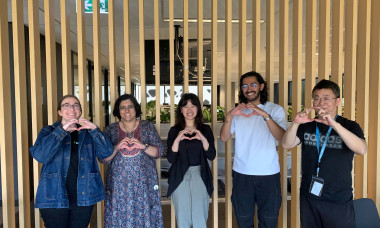Are specialised projects the future of TAFE industry engagement?
Technology businesses in the Melbourne innovation hub Cremorne have long had difficulties sourcing the talent they need to grow and thrive. With a dearth of digital skills causing salaries to skyrocket unsustainably, they’ve been desperate for a supply of job ready digital professionals.
That situation may be about to change thanks to a landmark Digital Skills Organisation pilot project.
Going digital with skills in Cremorne
Bringing together employers like Carsales.com.au (which has 1500 employees across a number of businesses and countries) as well as leading local TAFE Bendigo Kangan Institute (BKI), the pilot project will deliver entry-level digital talent to meet industry demand and level up innovation.
“It’s an employer-led approach focusing on generating entry-level digital professionals with the right mix of skills to be employed in Cremorne. It’s not just about training for roles and occupations but the skills they and employers need to be successful,” DSO chief executive Patrick Kidd says.
While it is a local pilot creating a local solution, the approach and supporting materials are expected to allow digital training to be scaled with the help of BKI across the Australian Registered Training Organisation sector in future. “It is much, much more than a local program in Victoria.”
Are specialist projects like this the way of the future for TAFE industry engagement?
The specialised project model
Meeting the needs of industry is one area where VET is often urged to do better. By designing training in line with the skills employers need, so the mantra goes, providers will be producing job ready graduates with the right skills, boosting career outcomes and our economic fortunes.
However VET in many cases already does this well. Is there a way that it can be done better?
One answer may be the specialised project model.
Specialised projects have the potential to utilise real world scenarios, as well as the employers, education and training providers and learners involved, in ways that deliver more obvious and measurable outcomes for all faster, and solving for the needs of the employer market.
Cremorne is proving to be a great example of this mode of learning design in action.
- The employer
Carsales is looking to address digital talent supply, including a significant lack of diversity in candidates. “At a core level we would like to see more supply of talent. As a tech business, it’s our lifeblood and we don’t exist without it,” Carsales CEO Cameron McIntyre says.
But Carsales isn’t looking for just anyone. There are some specific skill areas where it is looking for talent, including programming, digital design, UX and UI, quality assurance, project management and cyber security. It sees filling those gaps as important to its future as an Aussie tech success.
This needs to go along with foundational capabilities. McIntyre identifies the ability communicate, to interpret a business, to communicate basic problems and translate that into digital outcomes. “Those other skills sets that don’t necessarily get taught at university are extremely important.”
- The trainer
BKI has repositioned its TAFE campus in Cremorne to meet and help solve the digital skills challenge faced its neighbours, or the new ‘tech giants of Australia’. It is actively opening up a talent pool that includes diversity in age and background to deliver on entry-level digital skills needs of industry.
“We’ve always been industry-led and it depends what industry needs,” CEO Sally Curtain says. “In this instance, the hybrid traineeship model where students can earn, learn and work to deliver entry level digital skills will support the tech giants around us, and we can then deliver this at scale.”
TAFE in this case is working closely with employers to in a training pilot project that will build digital and soft skills that are in demand. It could end up making anyone in the Australian workforce - with some reskilling and honing of soft skills that are so in demand - highly transferable into digital.
- The results
While the project is still being run, it has the potential to shape a digital skills solution not only for local employers, but for the wider digital skills problem Australia is facing. Australia is expecting more than 150,000 digital professionals at a minimum to be required over the next five years.
The ability for TAFE to scale learnings will be critical. With less ability for business to import talent due to Covid-19 and companies having to pay more for talent (up to $160K for an entry level role at some tech firms), Patrick Kidd says small businesses and start-ups will struggle to survive.
“We need to open up a pipeline of entry level talent. That involves increasing the numbers that will consider a digital career and working with employers to increase jobs in the economy. But we also need increased capacity in training system to deliver the numbers required.”
The technology factor
Technologies like Student Management Systems can play a role in supporting education providers to get the most out of specialist projects in the future. Just one of those ways is getting students into available project opportunities or placements based on what they care about and who they are.
That’s because students studying tech aren’t all the same; those who want to work at Google are different from those who want to work at IBM. Student profiles within an SMS can capture more about who students are to match up with projects, internships and employment pathways.
ReadyTech’s JR Plus can allow providers to ask students to self-declare what they are interested in on an application form right at the point of enrolment. They can capture what industries they want to apply skills in, whether it be AI, cyber security or applying technology to government clients.
With a deeper student profile the right students end up matched with the right projects.
Will the future see more specialised projects?
Specialised projects, due to their nature, could become a bigger part of how TAFEs and VET adapt to the changing needs of industry. Co-designed projects with agreed scopes have obvious, known outcomes and better buy in, with employer results measured on a much shorter feedback loop.
Rather than an always on compliance requirement to undergo industry consultation, which risks complacency and a longer turnaround for results, they demand upfront skin-in-the-game investment, creativity as well as close partnership from all of the stakeholders involved.
They also happen to be more relatable for students. When a student can see known brands like Carsales and past students being involved in a distinct, innovative project, it produces a halo effect that benefits an education provider beyond generic statements of industry consultation.






